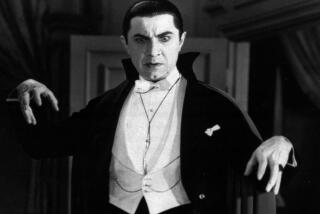MOVIE REVIEW : Too Many Pieces Blur the Picture in ‘Jacob’s Ladder’
- Share via
In the best puzzle movies, the pieces fit--eventually. But if you try to piece together “Jacob’s Ladder,” all you get for your trouble is more pieces.
It’s a movie about a man experiencing dreadful, recurring hallucinations and, since it’s shot almost entirely from his point of view, you never know what’s real and what isn’t. Why should we care? The multi-layered weirdness works on a basic, horror-film level but it’s without psychological resonance. We’re more concerned with the nature of the events than with the nature of the man they’re happening to.
At the beginning of the film (throughout San Diego County), Jacob (Tim Robbins) is severely wounded in a skirmish in the Mekong Delta. When we next see him, apparently years later, he is living in Brooklyn, separated from his wife and working for the post office. Trapped one night in an underground subway, he thinks he sees ghouls peering out at him from subway cars. When the demons reappear in the city streets, he thinks he is going crazy.
The appropriately named Jezebel (Elizabeth Pena), the woman he lives with, tries to cool him down--literally. After one of Jacob’s hallucinatory jags, he catches such a fever that she dumps him in the tub with 50 pounds of crushed ice.
Adrian Lyne, the director, is best known for “Fatal Attraction” and “Flashdance.” The screenwriter, Bruce Joel Rubin, wrote “Ghost.” That’s an unholy alliance if I ever heard one. Lyne is a master of lickety-split visuals that work audiences over like the spiffy TV commercials he used to make. In “Jacob’s Ladder,” he isn’t merely portraying paranoia, he’s selling it.
There’s a bludgeoning quality to his work in this film that detracts from even its good moments--like the cuts to demons that are so rapid-fire you’re not sure you actually saw them at all. (The expert editor is Tom Rolf.) When Lyne stages one of Jacob’s freak-outs at a dance party, he turns the sequence into an orgiastic horror. It’s “Flashgore.”
One of the traditional pleasures of reality/fantasy scare movies is discovering the horror as you go along. “Jacob’s Ladder,” after its Vietnam credit sequence, opens well. Jacob’s descent into the subway nether world has an insidious allure; everything seems realistic and yet slightly off. When Lyne trusts the audience to settle into the subtleties of mood he can be very effective. But he doesn’t trust often, and the assaultiveness of the imagery and the set pieces turns ugly after awhile.
It’s an assaultiveness unrelieved by humor. Isn’t it redundant to film a movie about a city crawling with demons in New York ? There’s a great untapped black comic premise here: In a city like New York, how can you separate out the demons from the regulars? If the film had been set in a small Midwestern town--as was the cult horror classic “Carnival of Souls,” from which this film borrows liberally--it might have seemed a lot spookier.
In the way the film mixes dread and uplift, “Jacob’s Ladder” resembles “Ghost,” sometimes right down to the bathed-in-holy-light staging. But “Ghost” had a romantic core of metaphysical sappiness that “Jacob’s Ladder” lacks. Jacob isn’t a romantic character; he is too much of a cipher to be much of anything. Even though Lyne and Rubin attempt to use his Vietnam servitude to rack up anti-war points, it’s just window dressing. This film is about as socially conscious as “Total Recall,” another bludgeon derby that also featured a zonked hero with a faulty memory bank.
Maybe the oddest thing about “Jacob’s Ladder” (rated R for violence, nudity and profanity) is that, underneath all its fantasy/reality avant-gardism, it’s rather testily old-fashioned. Danny Aiello, playing Jacob’s best (and only) friend, is the film’s voice of sweet reason. He is a chiropractor--a big, burly angel--who adjusts Jacob’s back and soul. One of his choicest pieces of advice is that Jacob should stop playing around and return to the wife who still loves him. And just so we don’t forget what a wrong woman Jezebel is, Lyne has Elizabeth Pena traipse about their apartment topless. The film is shameless about crying “Shame!”
Really effective horror films make us participants in the horror. “Jacob’s Ladder” doesn’t draw us in in that way. It’s a movie about interior states that’s all on the outside.
More to Read
Only good movies
Get the Indie Focus newsletter, Mark Olsen's weekly guide to the world of cinema.
You may occasionally receive promotional content from the Los Angeles Times.









